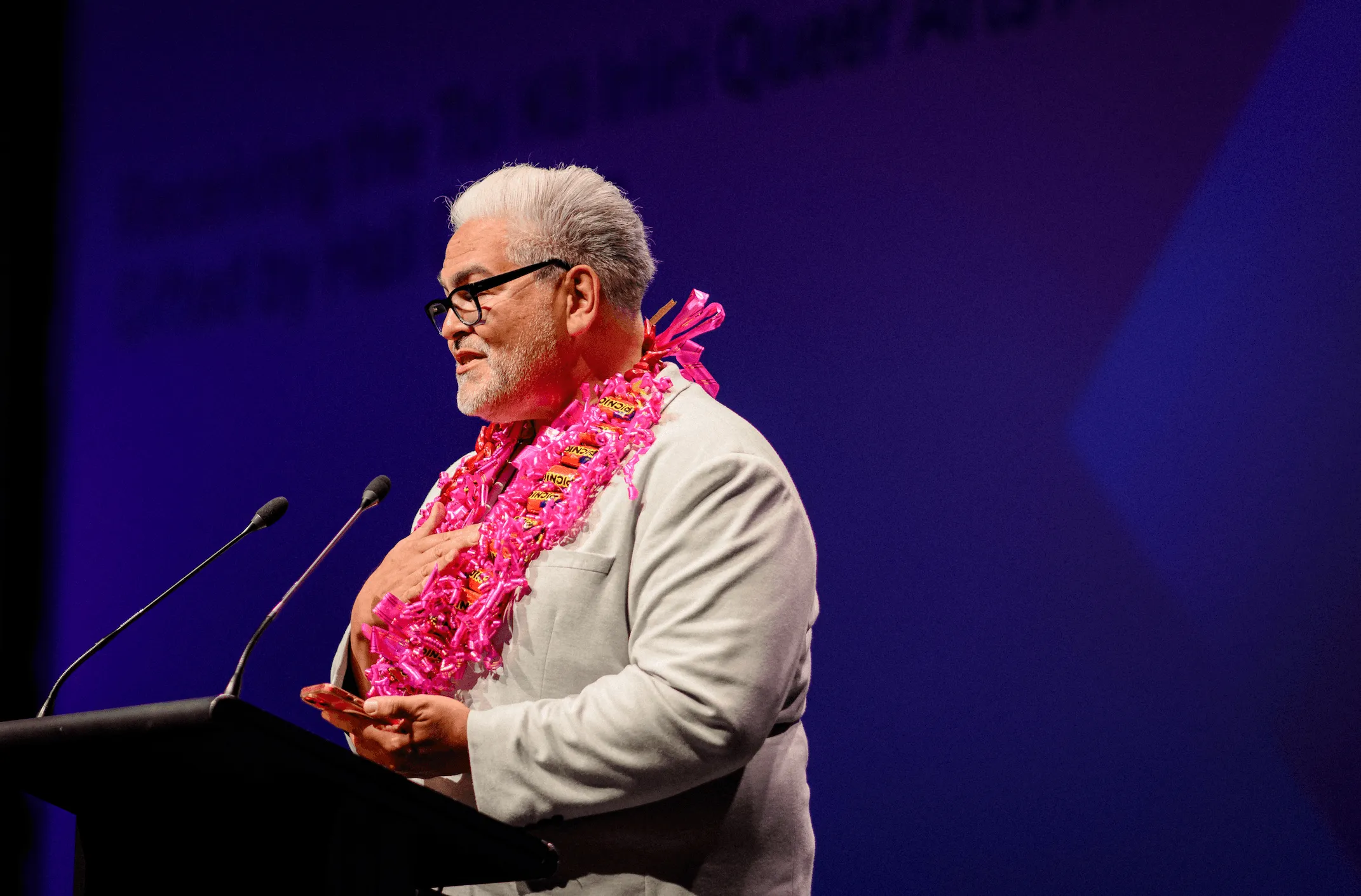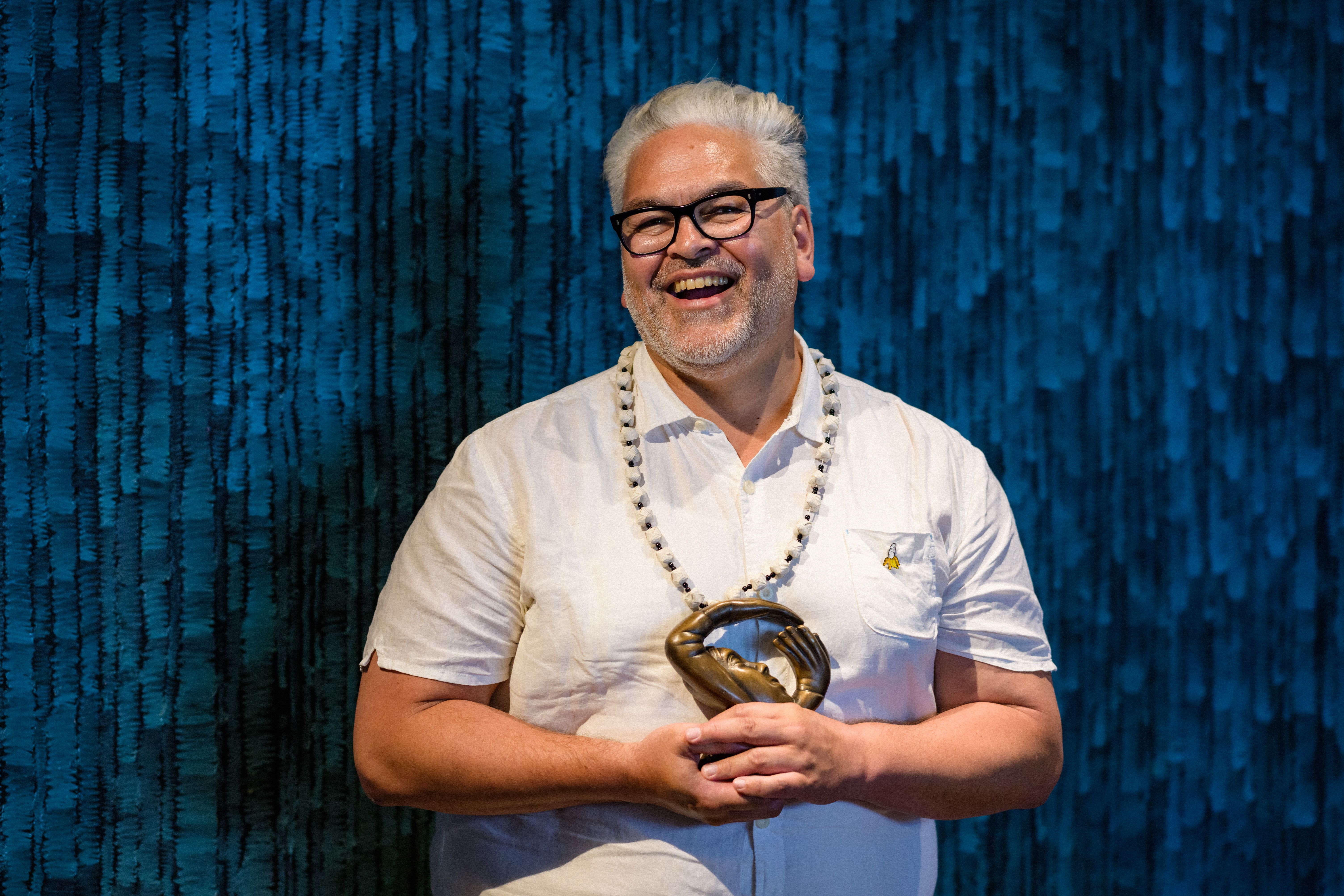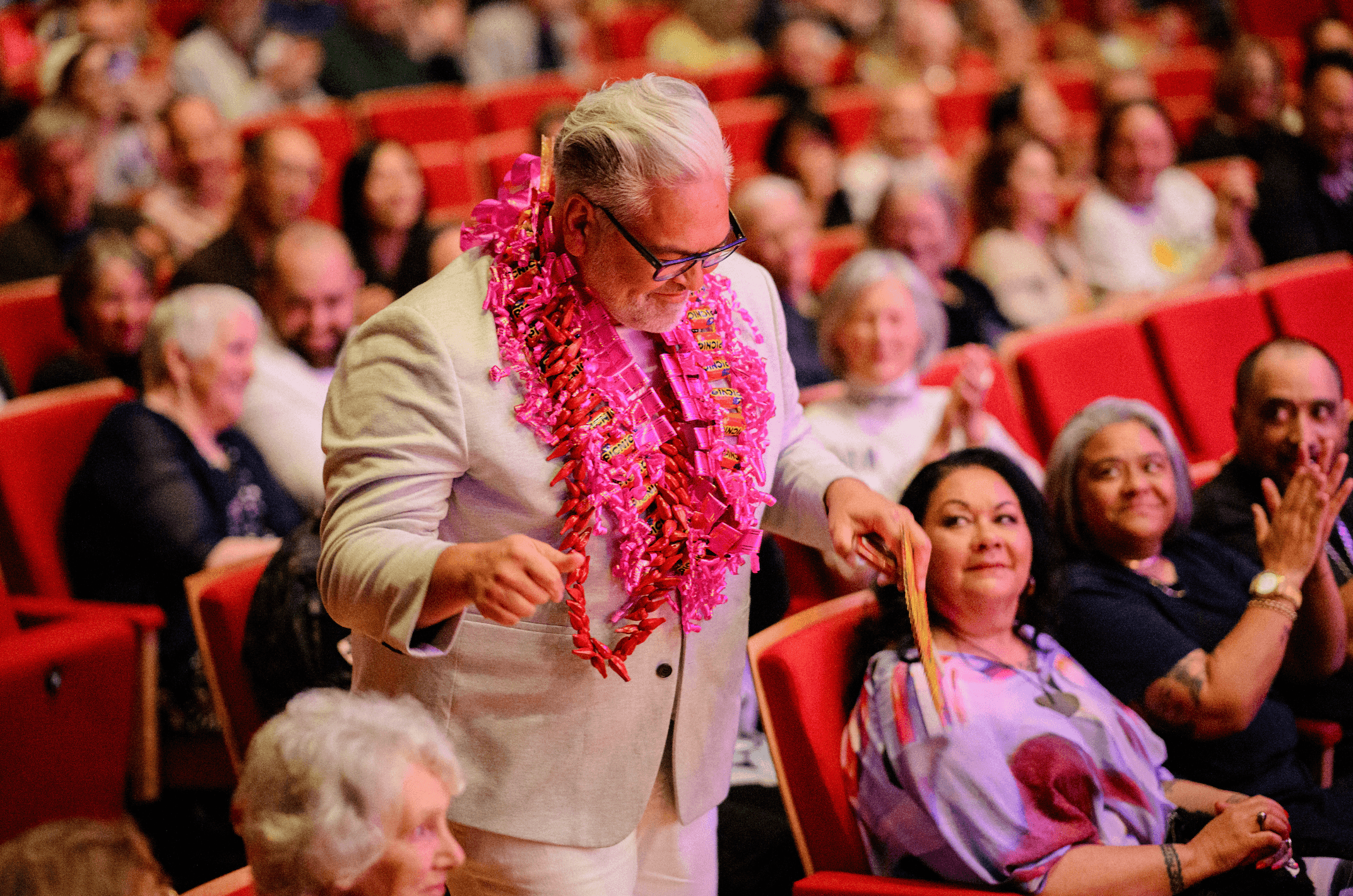To Victor, The Spoils
From feeling lost in his identity to becoming one of Pasifika's most creative voices - Victor Rodger opens up on his path to becoming an Arts Laureate.

Victor Rodger is tackling his advancing years with fresh vigour.
The gifted playwright and writer was rewarded Arts Laureate status - alongside seven other outstanding artists at Kiri Te Kanawa Theatre on Friday night (18 October). He was in fine form as he was presented the Toi Kō Iriiri Queer Arts Award for what he’s achieved for the creative and Pasifika communities in Aotearoa by his cousin, acclaimed Ōtautahi poet and 2020 Laureate Tusiata Avia.
“Yeah gratitude, it’s weird isn’t it? I want to thank those who advocated me for this award. And if you try to block me I forgive you and hope one day you can forgive yourself.”
Victor's full plate
Rodger sat down with The Big Idea with a morning coffee in Auckland’s viaduct, talking frankly and eloquently about a career that’s spanned nearly three decades since his defining debut Sons and includes Black Faggot, My Name is Gary Cooper - alongside producer of the multi-award-winning play Wild Dogs Under My Skirt written by Avia, which was presented Off-Broadway at the SoHo Playhouse in 2020. He was also elevated to the status of an Officer of the New Zealand Order of Merit in 2021.

That razor sharp wit and ability to “comfort the disturbed and disturb the comfortable” have come from embracing his Samoan/Palagi identity. There have also been seriously dark moments.
He’s booked a garret in Paris for early in the New Year, a chilly immersion in two projects including his first (and it seems probably only) collection of short stories.
“I’m looking forward to it because I’ve never been to Paris in winter .. so this will be a different experience - make me stay home more and write more. I’ve really got several projects in several states on the go.
"That short story collection is on my time. But I’m attached to three different TV shows which are at various states of development. And I’ve got money from CNZ to develop a play because I haven’t written a play for a while.”
It’s called A Boy from Vaiala - and in true Rodger style, the story is an outrageous and fascinating take on his culture.
“That’s a village in Samoa .. I have a man who is like an uncle to me, Uncle Pasi, who used to run a strip bar called The Purple Onion in Wellington. As a Samoan man of his generation - he’s 90 years old now - he's quite unlike anyone I’ve ever met. I’ve been eager to tell his story - or a version of his story - for a very long time. He’s been a slow burn in agreeing to it - his story goes from Vaiala to Las Vegas to the Hutt, and the arc is .. well, come see it when it’s released.”
The inner battle
Rodger is happy and invigorated by his array of projects on the boil, and the Laureate injection of $35,000 certainly helps. But like so many in the artistic world, there are crippling lows that can lurk deep below the surface.
He has spoken candidly about these periods of turmoil in the past but took a few moments to describe his mental health struggles. There’s no quickfire wit on this subject matter.
“In a nutshell there were three spells where I went dark. I guess what I learned is that nothing stays the same. It either gets better or it gets worse.
"The most hideous thing I’ve learned is that just when you think you’ve reached the bottom, there’s always another level down. Pretty horrific - but conversely there’s another level up.
"Maybe three profound bouts of unravelling, which is what I call it. What I will say is I’m glad I’m alive. Nice to be on the other side of the mountain.”
He chuckles when asked if his writing and creativity helped dig him out of the abyss.
“Each time ...without going into it .. it’s been similar. I know in two cases, I cracked a joke and it was like .. oh I’m back. It seemed to be that simple.
"I know each time I’ve unravelled there’s a period where I thought well this is my state. Full stop. That’s scary. How much of that is me being a catastrophising drama queen? I don’t know.”
After emerging from those dark moments, Rodger is acutely aware he’s far from alone.
“That’s the thing, you never know what’s going on with people. I’m so conscious of that. As someone pointed out to me, everyone is in a kind of fight of their own. Whether it’s profound or really deep and full on.”
From Christchurch to Ferndale
He wanted to be a writer from a young age and there was frustration that he was never heard of his class in English. He got into journalism straight out of high school, specifically with the goal to become a film reviewer.
For many years, Rodger paid the bills as a writer and as the on-screen character Doctor Henry Mapasua on Shortland Street.
“I can’t deny that. It did. It was a really good living. I have to admit they didn’t always get the best out of me. I think I worked for them from 2000 to 2013 so that’s quite a chunk of time. What can I say without sounding ungrateful?
“That tension .. nothing compares to generating your own work ..you were sort of given the story and turned it into dialogue. Before I started working for Shortland Street, my sister who was at high school sent me five dollars. I thought 'oh my god I’m going to go and get a sausage roll'. I was bumming around on the dole and doing occasional gigs.
"It was one of the few ways you could earn a decent living as a writer in Aotearoa. Anyone who worked with me there will tell you I’m terrible with deadlines.”
Mother's boy
Any conversation with Victor Rodger has to include the respect and adoration of his young single mother who raised him in Christchurch, and his resentment and eventual reconciliation with his Samoan father which has fueled so much of his writing.

He paid a loving tribute to Nora Williams on stage at the Arts Foundation showpiece.
“The whole reason why I wanted to write my first play in the first place was to represent my very specific point of view...when I was having this drama with dad which led me to being factually half Samoan and half white but having no grounding in the Samoan world - no chance of negotiating the Samoan father. I was so desperate to reflect that with Son.
“Some people occasionally say it’s really interesting you chose to do that, given you had that tricky relationship with your father. But I started out with that very personal play and pretty much from then, every work bar one has dealt with Samoans, specifically Pasifika characters. Some people find that ironic seeing my mum raised me by herself.
"Coming back to mum, I don’t know if she found it ironic. She’s just always let me do my own thing and find my way.”
She still lives in Christchurch with his Samoan step father and youngest brother.
“I mean we’re close, very close, the three of us, me, mum and step dad - we’re the same generation and my siblings are one generation back. We're doing that downward slide at the moment .. oh my side, oh my back … (increasing niggles} .. it’s grim!
“I got there with Dad in the end, in my own way … we had this amazing unprompted three hour talk where we laid it all out on the table and that was incredibly healing for me.”
Feeling out fiction

The list of achievements and opportunities extends deep into his colourful career with a bunch of university residencies at home and abroad, which certainly helped develop and broaden his range into an exciting new realm.
“I instantly think of the one I held in Otago .. the Robert Burns," Rodger reflects. "Not to sound wanky but that’s the year I tried fiction on for size.
"When I go to Paris in January, that will be to finish my first and hopefully my last short story collection. So that’s been a long gestation.
"Fiction doesn’t come as easily to me as script writing. That's more about rolling up my sleeves and getting the words exactly right. But I do like fiction so those later residencies .. they give you the latitude to write but sometimes they just give you the space to be.
"It is a pleasure to contemplate work without having the stress of finding somewhere to pay the bills. Shortland Street taught me that money is something, but not everything.”
The list of achievements includes being published in several notable anthologies, including Black Marks on the White Page and 50 Stories for 50 Years in Aotearoa.
He is committed to nurturing new talent - co-convening the Māori and Pasifika creative writing workshop at the International Institute of Modern Letters at Victoria University. Not to mention founding FCC (Flow, Create, Connect) - the theatre company dedicated to creating and encouraging Pasifika talent.
“I always bang on … the younger generation of Pasifika writers are always hungry for work, that’s like 'ooh, they said that!', as opposed to a community-friendly piece. It needs to be provocative, saying the stuff that needs to be said.”